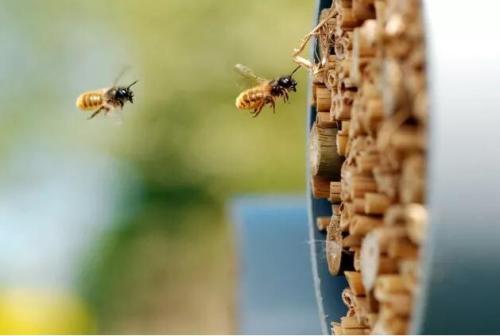Does insecticide work on bees? Can it kill bees? Conkuan pesticides are harmful to bees
Pesticides caused a disaster, and a large number of bees died of acute poisoning. Watching Huang Cheng and fluffy western bees fall to the ground and twitch one by one and never fly again, the bee farmer surnamed Hsiao, who keeps more than 200 boxes of bees in Kaohsiung trees, also looks helpless.

After an in-depth inquiry into the cause, the bee farmer surnamed Xiao excitedly pointed out, "this is a typical symptom of pesticide poisoning." The poisoned colonies not only become violent and easily bite bee farmers, but also increase the number of deaths by 30 to 40 percent, almost "carpet deaths." The reason for the "slaughter" at his location may be that the longan garden nearby was wantonly sprayed with pesticides to control the recently rampant litchi stink bugs. Kangkuan insecticide is one of them.
Serious deaths and disasters broke out again and again, causing dissatisfaction among bee farmers, and immediately asked the Prevention and Inspection Bureau, which is responsible for pesticide management, to be responsible. After working with the agricultural improvement farm in Miaoli District to send people to further sample and examine the bodies of western bees, it was found that pesticides such as Fenpril, Fuhuali, Taosong, and Gabriel caused the disaster and came into contact with or ate bees that were sprayed with excessive pesticide crops. then died of "acute poisoning."
Can not wait for the bees to return home, a large number of lost lost. Although the test results set the tone, but at the same time, the colony showed another abnormal behavior. Hsiao Hung-chi, a bee farmer in Nantou, found that at first, more than 1/4 of his bees went out and never returned to their hives. A few weeks later, the colony population was inexplicably reduced by half.
"We really can't wait for them to go home in the evening." collecting the common observation experience of dozens of bee farmers, Pan Jianming, secretary general of the Taiwan Beekeeping Association, also pointed out that over the past few years, bee farmers have found that their bees go out to work in the morning to collect honey, and before sunset in the afternoon, the number of bees has plummeted to about 10,000, but the number of bees has plummeted to about 10,000, with no corpses outside the box. I don't know where the bees went, like being "collectively kidnapped".
A study by National Taiwan University found that the "chronic poisoning" caused by pesticide Yidaamide affected the neurodevelopment of honeybees. Not only is the colony missing, Pan Chien-Ming also said that among the hundreds of boxes of western bees, a certain proportion of the colony will "become stupid."
Western wasps, which could have relied on "bee dance" to convey messages and follow specific behavior patterns to survive and work, forget how to gather honey among the flowers, and their flight paths are crooked, as if they were "possessed" and lost their ability to survive. However, bee farmers did not figure out the cause until the official publication of a study by Yang Encheng, a scholar at National Taiwan University, on the pesticide "Yida amine."
Yang Encheng, a professor of entomology at National Taiwan University who specializes in honeybee behavior, confirmed in 2014 that "even an ultra-low dose of ppb can affect the neurodevelopment of honeybees." Although the dose of predamide ingested by the larvae will not be fatal, the learning and memory abilities of bees will be severely damaged during their growth, which is tantamount to "chronic poisoning."
He further explained that in the course of the experiment, the honeybee larvae were fed with prednisolone and dissected after they were feathered into adults, and it was found that the "mushroom body", which is responsible for the memory and learning ability of the honeybee brain, was abnormal. Yidamide significantly affects the number of synapses between the connecting nerves adjacent to the mushroom, leading to problems in the transmission of signals received by the compound eyes and antennae, which in turn affects the formation of memory. "although it can't be seen in larvae, memory and learning will collapse after Eclosion. "
- Prev

The edible method of hemp, what is the function of mai soup, and what is the nutrition and effect of hemp?
Not from the middle, may be a little strange to this plant, the Spring Equinox just passed, the mountain newly planted jute (jute), a lot of green. After rubbing away the bitter juice from the sesame leaves in water, add the larvae to boil to make a cool and summer-relieving mackerel soup, which is for the ancestors to deal with the hot summer.
- Next

Brief introduction of Phalaenopsis, Phalaenopsis species Picture characteristics of Phalaenopsis
Phalaenopsis Phalaenopsis as soon as the name knows that this is a variety of Phalaenopsis, the flower shape is relatively small. This variety of Phalaenopsis is produced by a variety of Phalaenopsis. The flower is smaller than the average Phalaenopsis, so it is called Phalaenopsis. Floret butterfly orchid
Related
- A course of planting techniques and methods on how to grow carrots
- How to plant the latest tulips?
- Is it better to pick tea in the morning or in the afternoon? When is the best time for tea to be picked? what is the third or fifth tea?
- Launch Yuanxiao Happy combination Haocha + Tea Yuan healthy Taste
- Penghu Tourism "Fireworks 20 Parade with You"
- 2022 West Lake Happiness holds "Digital Revitalization Voucher" and draws iphone13 and laptop.
- Banqiao Fuzhou social houses are designed to change start-up combined with police elimination to create a safe and livable environment
- The convenient measure of "mechanical weeding" in Xinbei has been abused and the Agriculture Bureau has imposed heavy penalties on the illegal land consolidation.
- Changgeng University Joins Hands with Four Memory Factories to Rescue Memory Talent Shortage
- The list of Taiwan's top 100 MVP managers is listed by the Director-General of the Farmers' Association of Sanxia District.

